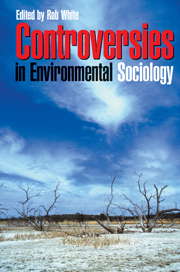Book contents
- Frontmatter
- Contents
- Tables and Figures
- Author Notes
- Abbreviations
- Introduction: Sociology, Society and the Environment
- PART I SOCIAL PERSPECTIVES
- PART II SOCIAL TRENDS
- PART III SOCIAL ISSUES
- 12 Moulding and Manipulating the News
- 13 Agricultural Production and the Ecological Question
- 14 Pathological Environments
- 15 Assessing the Social Consequences of Planned Interventions
- 16 Criminology, Social Regulation and Environmental Harm
- Index
- References
12 - Moulding and Manipulating the News
Published online by Cambridge University Press: 05 June 2012
- Frontmatter
- Contents
- Tables and Figures
- Author Notes
- Abbreviations
- Introduction: Sociology, Society and the Environment
- PART I SOCIAL PERSPECTIVES
- PART II SOCIAL TRENDS
- PART III SOCIAL ISSUES
- 12 Moulding and Manipulating the News
- 13 Agricultural Production and the Ecological Question
- 14 Pathological Environments
- 15 Assessing the Social Consequences of Planned Interventions
- 16 Criminology, Social Regulation and Environmental Harm
- Index
- References
Summary
The media are accused of bias by people from both ends of the political spectrum, but journalists, editors and owners maintain that they provide an objective source of news. This chapter will consider the ways in which the news is shaped and how this in turn influences the way environmental issues are reported and constructed in the mass media.
In the United States, where the debate over media objectivity is most heated, conservatives criticise the media for having a ‘liberal’ bias and these critics focus on the personal views of journalists, editors and media owners who, they argue, tend to be elitist, left-leaning and politically correct. A number of books have been published recently highlighting this supposed liberal bias including Press Bias and Politics: How the media frame controversial issues (Kuypers 2002), Bias: A CBS Insider Exposes How the Media Distort the News (Goldberg 2003b) and Arrogance: Rescuing America from the media elite (Goldberg 2003a). Goldberg argues that ‘the majority of journalists in big newsrooms slant leftward in their personal politics, especially on issues like abortion, affirmative action, gay rights, and gun control; and so in their professional role they tend to assume those positions are reasonable and morally correct. Bias in the news stems from that …’ (Goldberg 2003a: 4).
Accusations of liberal bias, however, are not new. Richard Nixon and his vice-president Spiro Agnew repeatedly referred to the bias of the media, particularly with regard to the Nixon administration, and Agnew called journalists ‘pointy-headed intellectuals’ (West 2001: 65).
- Type
- Chapter
- Information
- Controversies in Environmental Sociology , pp. 204 - 220Publisher: Cambridge University PressPrint publication year: 2004
References
- 6
- Cited by



